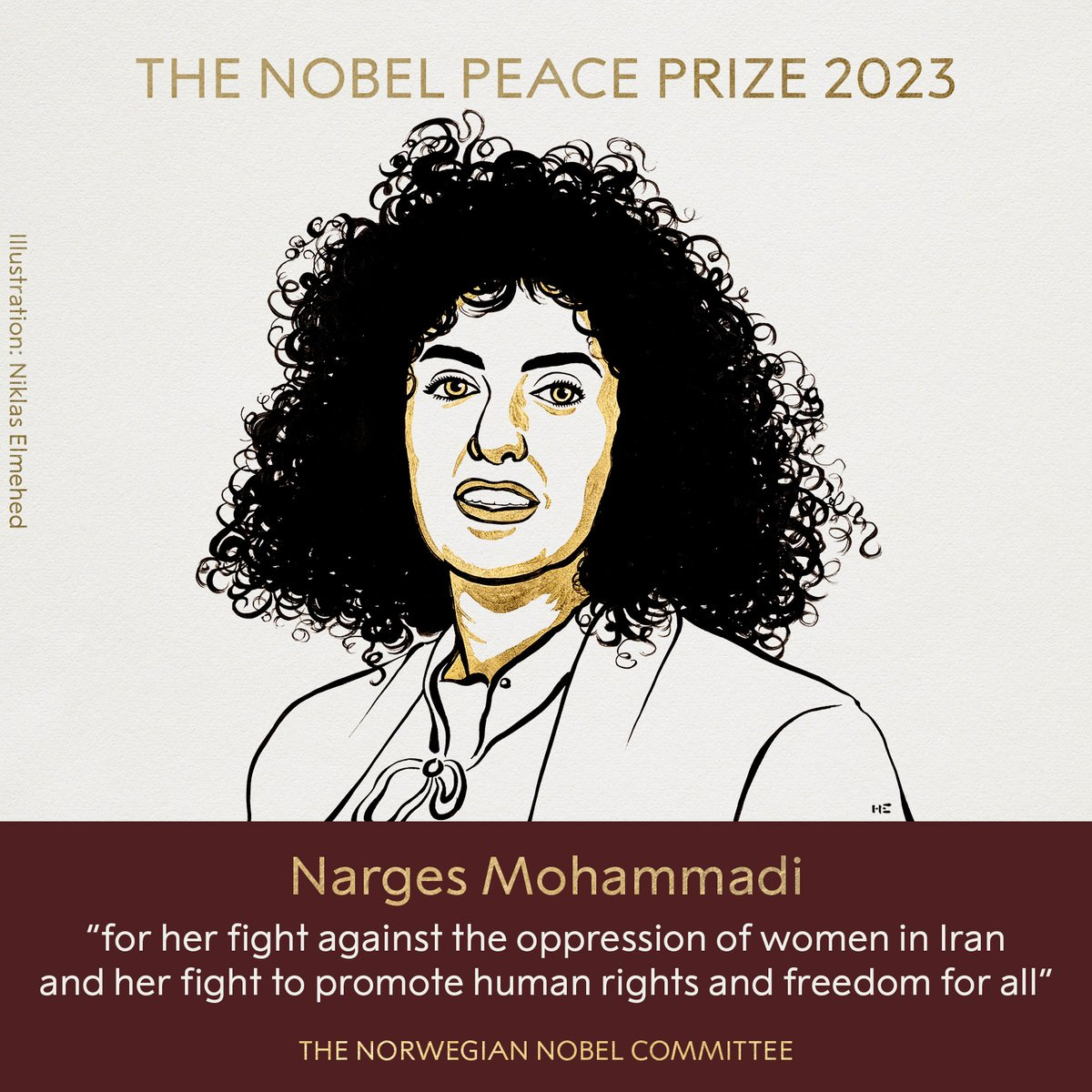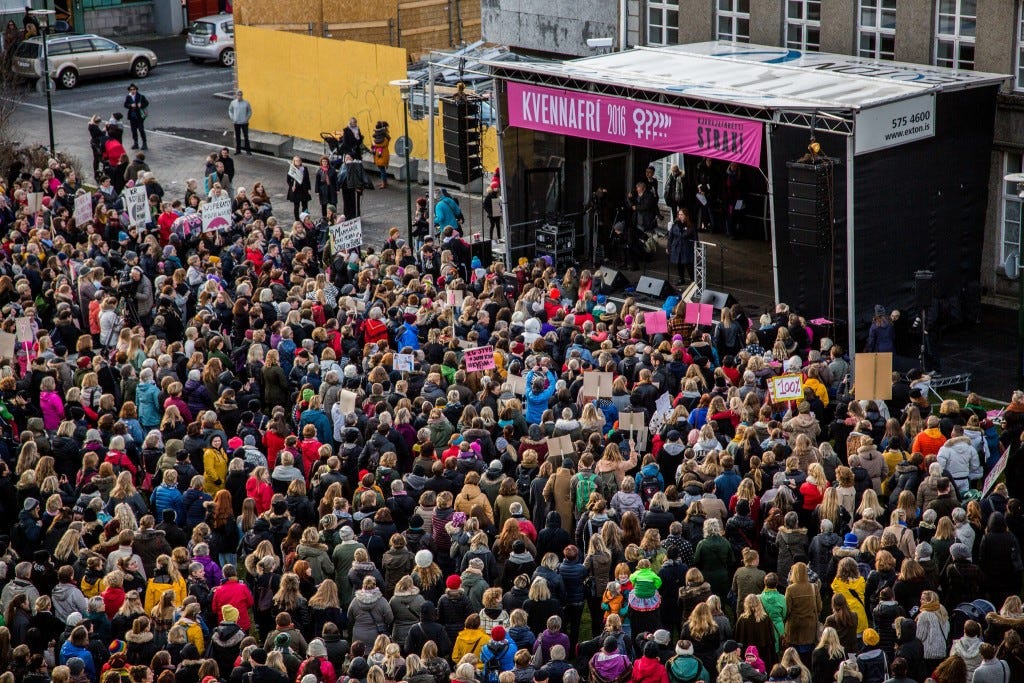Setbacks in women’s representation, Iceland’s strike and Nobel Peace Prize: All you need to know about women in politics from October
#WomenLead (Issue 144): Your monthly round-up on women in politics
Hello, and welcome to the October 2023 edition of #WomenLead!
This month has seen legislative elections in several parts of the world. But alas, in so many of them, women’s representation has seen drops rather than gains. It has already been a tough year, so that is no good news.
In this edition, we bring you updates from Argentina, Iceland, India, Iran, Liberia, New Zealand, Poland, and Switzerland. In case you missed last month’s edition, you can read it here.
Election Watch
Tracking women among candidates and winners
🇨🇭SWITZERLAND: Seventy-seven women have been elected to the 200-member Senate in Switzerland in polls held in October, making up 38.5 percent of all members. This is a decline as compared to the previous polls, when 42 percent of all those elected were women. Read more in SwissInfo here.
🇱🇷 LIBERIA: The African nation held polls to elect its 55th legislature this month. A total of 153 women contested from various seats of the House of Representatives, but only seven were elected to the 73-member house, the Daily Observer reported. The outgoing house had eight women members, according to the Inter-Parliamentary Union’s data.
🇦🇷 ARGENTINA: One more country where a lower number of women have been elected to the national legislature. In Argentina, the October 22 election saw 111 women get elected to the 257-member lower house (as compared to 117 women in the previous polls), Buenos Aires Herald reported. This is despite the fact that abortion and women’s rights remained central to the presidential polls that were held alongside the legislative elections.
🇳🇿 NEW ZEALAND: In New Zealand too, the share of women elected to the Parliament after a recent election will be smaller than the outgoing house. Preliminary results indicate that women will make up 43 percent of the Parliament, Stuff reported. The outgoing House of Representatives had gender parity (and had even seen more women than men for a brief period of time). Some good news, however, is the election of a handful of young women to the House, including 21-year-old Hana-Rāwhiti Maipi-Clarke who has become the youngest MP in the country’s history. Read more here.

🇵🇱 POLAND: Finally, one nation where the share of women did improve in the October election! A record 136 women have been elected to the Sejm, the lower house of the Polish parliament. Together they make up 29.6 percent of all members, up from 28.3 percent in the previous house. However, the number of women elected to the 100-seat upper house saw a drop from 24 to 17, Notes from Poland reported.
Leaders
Updates about women leading countries, states and movements
Iranian human rights activist Narges Mohammadi has been awarded the Nobel Peace Prize for 2023 “for her fight against the oppression of women in Iran and her fight to promote human rights and freedom for all”. Mohammadi has faced the wrath of the Iranian regime multiple times for her activism and has been imprisoned since 2015. As the award’s press release notes, “the regime has arrested her 13 times, convicted her five times, and sentenced her to a total of 31 years in prison and 154 lashes.” Read more here.

Image via the official X (formerly Twitter) account of The Nobel Prize On October 24, Iceland’s women went on a day-long strike to demand an end to unequal pay and gender-based violence. The day marked the 48th anniversary of the historic women’s day strike from 1975, a watershed in the country’s history.

Image via the official X (formerly Twitter) account of the Icelandic Ministry for Foreign Affairs. The Ministry shared the photo along with the caption: “Today we repeat the event of the first full day women’s strike since 1975, marking the day when 90% of Icelandic women took the day off from both work and domestic duties, leading to pivotal change including the world’s first female elected president of a country #kvennaverkfall” In what appeared as a befitting tribute to the 1975 strike that had paved the way for Vigdis Finnbogadottir to get elected as Iceland’s first female President in 1980, Prime Minister Katrín Jakobsdóttir also joined the strike. Iceland has been consistently ranked as a global leader on gender equality, but it is clearly not losing sight of the larger goal – to close the gaps absolutely, not just in relative terms. “We have not yet reached our goals of full gender equality and we are still tackling the gender-based wage gap, which is unacceptable in 2023,” Jakobsdóttir told news website mbl.is.
On-the-job Updates
Spotlighting women’s experiences in political office
Women remain under-represented in peace processes, a report of the UN Secretary General has highlighted. In 2022, while women participated in four out of five peace processes either led or co-led by the UN, they comprised just 16 per cent of total participants — a proportion that has actually decreased for two years in a row, the report said. “These negative trends are setting back both gender equality and global peace,” Sima Bahous, UN Women Executive Director, observed.
In India, MP Mahua Moitra from the Opposition, who is often in the limelight for her fiery speeches in Parliament, is currently under the scanner for allegedly taking bribes to ask questions in Parliament. If found guilty, Moitra could be expelled from Parliament.
While a formal process to determine Moitra’s actions is underway, she finds herself facing a personal smear campaign online with troll armies sharing pictures with the aim to attack her personally. The fact that a personal fight with a former partner has become intertwined with the political controversy is only making it messier. None of this is unheard of when it comes to women in politics, of course. Doesn’t make it any less jarring or obnoxious. Read more on this here.
Reading List
The more one learns, there’s only more to learn
“Beyond numbers: securing gender equality in politics”: Social Europe
“New research helps explain why Indian girls appear to be less engaged in politics than Indian boys”: The Conversation
“The success and sidelining of women peacebuilders in Solomon Islands”: United States Institute of Peace ( discovered thanks to
! )“Mexico: female-led presidential race cements decades of action”: Financial Times
“The female vote stems the tide of the far right in Europe and Latin America”: El Pais
“Germany's largest trade union elects first ever female chair”: DW
Before We Go…
A little piece of news celebrating a big milestone from history. On October 25, Belgium unveiled a special €2 coin to mark 75 years of universal suffrage for women in the country, The Brussels Times reported.
“Happy to unveil this piece which is intended to be a symbol and a powerful reminder of what women can achieve when they stand up for their rights,” House Speaker Eliane Tillieux wrote as she shared the news on social media.

That’s a wrap for October! Liked this edition? Then press the ❤️ button and show us some love! And please, please do share this with a friend or on your social media accounts. There’s frankly nothing quite like reader love and endorsement, so please keep it coming! Thank you!
Disclaimer: #WomenLead is a non-partisan newsletter produced in a personal capacity, and does not reflect any institutional affiliation/opinion. In case of any questions, please drop in a message at womenlead.project@gmail.com



